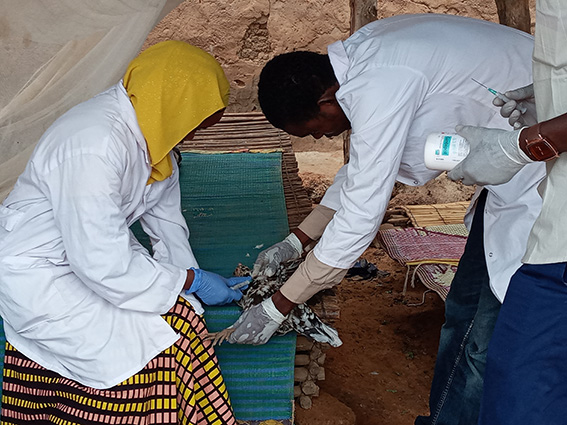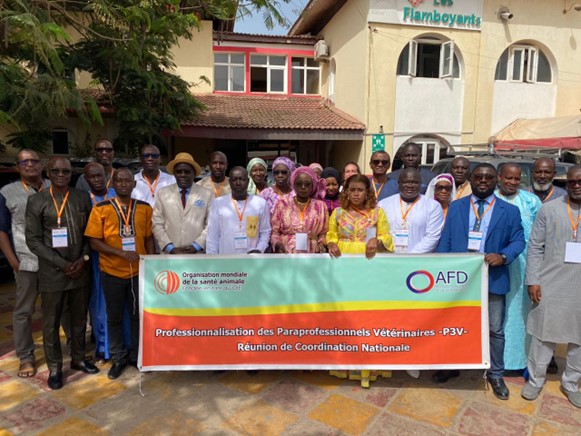
The P3V project (Professionalisation of Veterinary Paraprofessionals), financed by the French Development Agency (AFD), is being implemented by the World Organisation for Animal Health (WOAH). This project is an initiative aimed at improving access to quality veterinary services in Senegal, Togo and, more recently, Benin. Recent national coordination meetings in Togo and Senegal marked important milestones in the implementation of this project.
The national coordination meetings are the secondary governance body of the P3V project. Organised annually, they enable the implementation of project activities to be monitored, progress to be assessed, challenges to be identified and solutions to be proposed.
The fourth session of the P3V Project’s national coordination meetings was held in Togo on 6 and 7 May 2024 at the Luxembourg Hotel in Atakpamé, and in Senegal on 24 and 25 June 2024 at the Flamboyant Hotel in Saly. Each of these meetings was attended by around thirty participants, including representatives of WOAH, the Inter-State School of Veterinary Science and Medicine (Ecole Inter-Etats de Sciences et Médecine Vétérinaires, or EISMV) in Dakar, partner training establishments for veterinary paraprofessionals (VPP), non-governmental organisations (NGOs) operating in each of these countries, veterinary services, statutory veterinary bodies, VPP associations, professional associations of livestock farmers and women, training programme accreditation institutions, etc.
During these meetings, the Project team in each country shared the main activities carried out during the previous year and presented the activities planned for 2024. Overall, the activities carried out include support for partner establishments by providing equipment and training teachers in the use of the equipment offered, organising work placements for VPP students, supporting veterinary legislation, defining a strategy and action plan to strengthen the network of animal health professionals, organising in-service training sessions for animal health professionals, etc.
For 2024, the activities planned include extending the project’s activities to Benin, providing support for learning design and the professionalisation of training in partner establishments, in partnership with the FAR network (for rural and agricultural training), providing support for the organisation of student locums, and providing support for veterinary legislation in the countries concerned, the organisation of in-service training sessions for those working in the field, the production of teaching resources, support for establishments in acquiring additional equipment to strengthen practical training, an analysis of the professional integration of graduates from the establishments and the profitability of animal health activities, etc.
A participant to the training-of-trainers on the ALERT Game
In Togo, participants suggested increasing the number of in-service training sessions for VPPs, building the capacity of teachers and trainers in partner establishments, and providing material support to veterinarians for better supervision of training courses for students in VPP training establishments, with particular emphasis on laboratory diagnosis. It was also recommended that collaboration between the partner establishments should be encouraged in order to share good practice and resources, and that support should continue to be provided for the establishment of a national framework for consultation on animal health.
In Senegal, it was recommended that the composition of the steering committee be revised to include national stakeholders, that teachers from the Project’s partner establishments be included in training courses on veterinary legislation and regulations, that the strategy for strengthening the network of animal health professionals be validated and implemented, and that in-service training sessions on meat inspection be organised. It was also recommended that teaching aids be produced for the Project’s partner establishments and that the supply of materials and equipment to these establishments and to the establishments hosting trainees be continued. The Ministry of Agriculture, Food Sovereignty and Animal Husbandry (Ministère de l’agriculture, de la souveraineté alimentaire et de l’élevage) was asked to finalise the animal health code and the veterinary public health code, to sign the decree on the establishment of the CNFTEIA training council, and to update the decree on the framework for consultation between animal health stakeholders.
The P3V Project represents a relevant and timely initiative to improve access to quality veterinary services in Africa. Through its interventions, the Project has launched initiatives to improve access to quality veterinary services. The national coordination meetings demonstrate a strong commitment from stakeholders, which is an important element in ensuring the success and sustainability of the actions undertaken as part of the Project. The progress made so far is promising, but many challenges remain. Continued collaboration between the various stakeholders, including national stakeholders, breeders and project partners, will be essential to ensure the long-term success and sustainability of the P3V Project.



